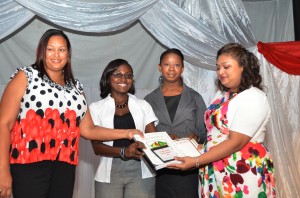
Guyanese students will now learn to speak Portuguese at the secondary level, as the Education Ministry last Thursday officially added the language to the curriculum, with five pilot schools kicking off the initiative.
The five schools which will commence Portuguese language training are: Queen’s College, the Bishops’ High School, St Stanislaus College, St Roses High School and St Joseph High School.
Speaking at the launch at the Theatre Guild, Kingston, Education Minister Priya Manickchand said since Brazil and Guyana enjoy close relations, persons learning Portuguese will boost these relations further and in turn, benefit both nations.
“While language will never stop Guyana from enjoying relations with anyone, surely familiarity with people of Brazil will help to bolster our friendship.”
Share experiences
She noted too that the countries will be able to share experiences to further develop, pointing out that Brazil is the sixth largest economy in the world. Manickchand stated that though Spanish and French are taught in schools, the country needs to examine if they are as relevant as they used to be.
She disclosed that the programme is commencing with five schools instead of six like she initially announced in May, since there are not enough teachers to teach the language. She added that the ministry will have to introduce the language in the Cyril Potter College of Education curriculum.
The education minister said the launch of the programme is simple but significant, as students can interact with Portuguese-speaking persons, hence making them more rounded.
CXC exam
She disclosed that Guyana is in preliminary talks with the Caribbean Examinations Council (CXC) for Portuguese to be an examinable subject. She expressed hope this could occur within the next two or three years.
“Don’t treat this as another course; treat it as if you will be first set of students in Caribbean that will write Portuguese at CXC and get distinctions.”
She added that the CXC registrar has already indicated its willingness to examine how it can get Portuguese on the CXC curriculum.
QC language department head Candida Williams, who assisted in formulating the Portuguese curriculum, acknowledged that the students might think that they are already having difficulties with Spanish and French and question why they have to learn Portuguese.
In seeking to convince students of the worthiness of the programme, she pointed out: “There is a large influx of Brazilians into this country and they are opening a lot of businesses here and many of you come into contact with them… some of you hang out with them, so you want to be able to communicate with them even if it’s just the basics.” She also told the students that the subject is similar to Spanish.
She disclosed that putting together the curriculum was not an easy task, noting that the major problem was getting materials. “I searched as far as North America, the Caribbean, and South America, since I was in Chile looking for materials. We were able to source one text along with some others we received from the Brazilian embassy.”
Curriculum guide
Students will be given two work books: one for in class and one for homework along with a CD to will aid in pronunciation, while teachers will have a curriculum guide for Grade 7 broken down into three-term scheme and weekly plan of work.
They will also be given a handbook on basic Portuguese, a copy of a textbook “Everything Learning Brazilian Portuguese” with a CD.
The developers will visit the schools on a fortnightly basis to observe teachers teaching the language and make the necessary modifications. The curriculum developers will also prepare a common test to be administered in all five of the schools. The ministry is hoping to extend the programme to other schools within the next year.



